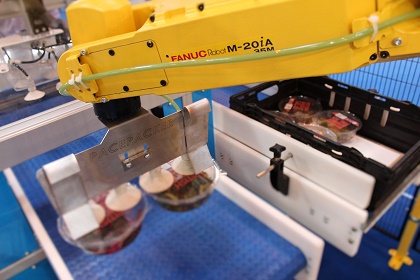|
|
 |
 |
 |
 |
| |
Educating the benefits of automation to food manufacturers – as they face short retail contracts
25
April
2016
|
| |
 Comment by Paul Wilkinson, Business Development Manager of Pacepacker Services
Comment by Paul Wilkinson, Business Development Manager of Pacepacker Services
Winning a large retail contract is a coup for any food manufacturer. However, supermarket price wars and changing food presentations to gain and maintain the interest of consumers, means that many manufacturers are being squeezed out of the market.
Today, most manufacturers understand the efficiencies gained from automation. Even so, many are still reluctant to invest in equipment for fear of not being unable to recoup their costs if the contract is terminated. Although the short-term nature of retailer contracts is a contributing factor to their reluctance to invest, other issues also come into play, including lack of technical knowledge, space constraints and the belief that systems are inflexible.
Switching from packing cakes to pork pies is simple with half a dozen manual workers, but what if you have invested in a robot to pack those cakes? The belief that robots and automation won’t flex to changing packing needs is a common misconception shared by many customers. They need their systems to not only boost efficiency but to be a tangible asset, one that can be moved between lines to meet changing demands and new contracts. We are all too familiar about how fast trends change, especially in the retail business. Yet, this shouldn’t deter food companies from exploring automation. Once the payload, reach and speed capacity has been determined it is relatively straightforward to re-programme a robot to perform another task. Similarly, if products are a different size then some changes may be required to the end of arm tooling or even replaced, but by no means is the robot redundant. Some robots can even be re-deployed into a completely different role within the business, for instance from pick and place to palletising. Also, a robot is a tangible asset with a saleable value. So, worst case scenario, the sale proceeds can be reinvested into an alternative business project.
Likewise, space should not be an issue. There’s a vast range of robotic devices in different sizes, and the ability to customise Cartesian systems using components and linear drives at specified lengths is perfectly feasible. Whatever the manual operation is, a robotic provider should be able to provide an automated solution.
Re-programming a robot may sound daunting to many and put companies off investing. Any reputable supplier will work closely with all project stakeholders to ensure appropriate training and ongoing support is provided. Remote assistance can also be provided if required so that office based engineers can take control of the HMi screens and help operators through the required steps or monitor what is happening through CCTV cameras.
For most, if not all customers, return on investment (ROI) figures can be the deal breaker. When looking to achieve ROI inside a year, manufacturers shouldn’t be swayed by price alone. A well-engineered solution will provide low cost of ownership for many years at a fraction of the cost of manual labour. Pacepacker recently developed a new ROI calculator - a comparative tool - that quickly measures the real value that a business can realise when automating different aspects of a production line. So, even with short UK retail contracts, an appropriate automated solution can be developed and accomplish the desired payback.
For more information, please contact:
Pacepacker Services Ltd
Unit 16 Bluegate Hall
Great Bardfield
Essex
CM7 4PZ
UK
Tel: +44 1371 811544
Fax: +44 1371 811621
Email: mail@pacepackerservices.com
Web: www.pacepacker.com |
|
|
| |
FactoryEquipment.com are not responsible for the content of submitted or externally produced articles and images.
Click
here to email FactoryEquipment.com about any errors or omissions contained within this article. |
| |
|
 |
|
 |
 |
|